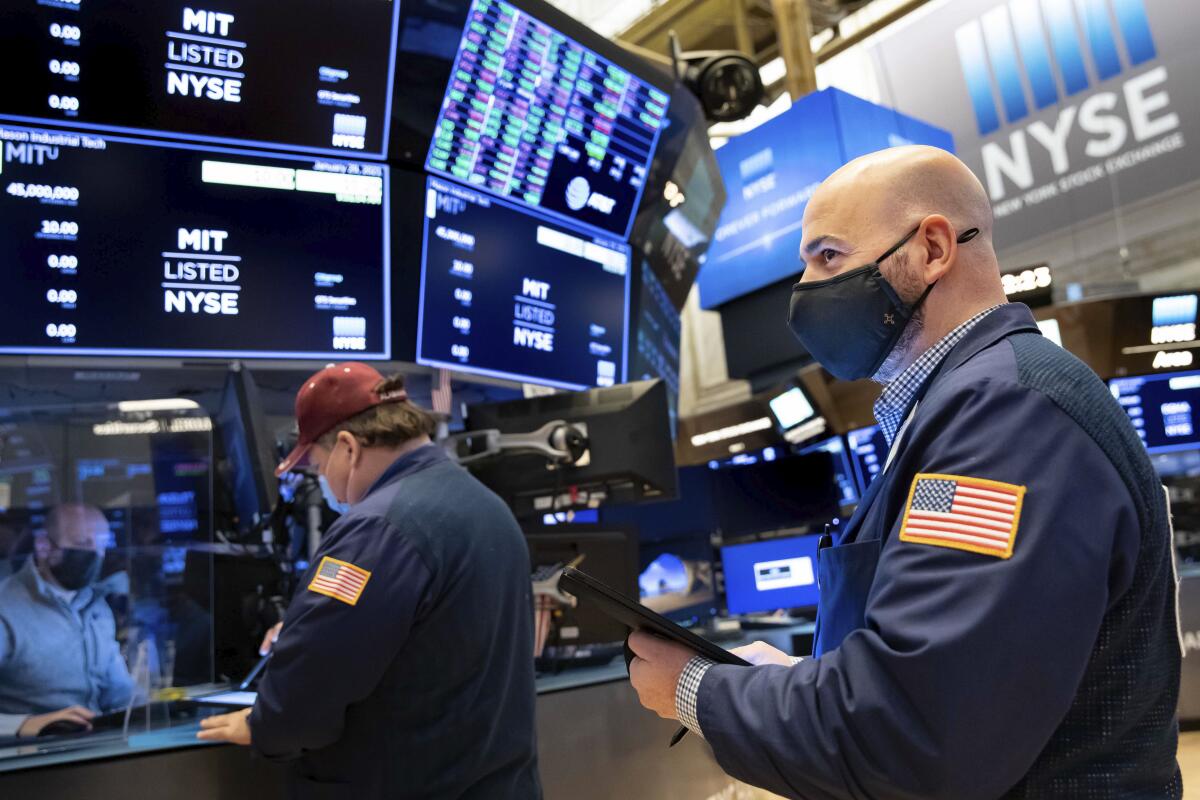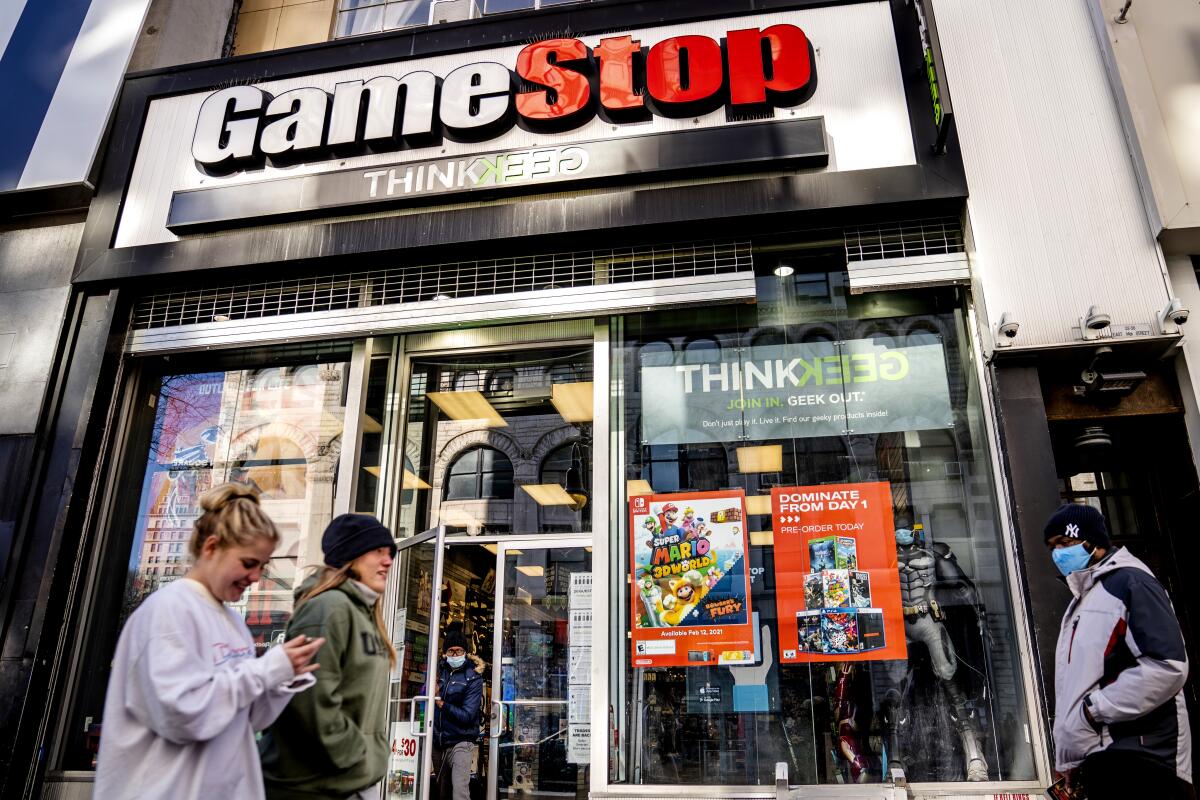GameStop investors’ motives: Take a YOLO bet. ‘Ruin a billionaire’s life.’
- Share via
For some, it was the desire to make a buck. For others, it was fear of missing out, anger at elites or idle curiosity about what was possible in a world where it’s increasingly hard to tell internet jokes from real life.
United by these disparate motivations, a legion of individual investors — along with some mighty Wall Street whales — turned GameStop, a money-losing video game retail chain, into the hottest stock in ages. After gaining more than 1,000% since the start of the year, its shares jumped another 68% on Friday, to $325, leaving the company worth more than $22 billion on paper.
GameStop’s precipitous ascent has been costly in the extreme for the hedge funds that were shorting its stock, betting that a brick-and-mortar chain would never recover from the one-two punch of COVID-19 restrictions and a long-term shift to e-commerce. It has been a historic windfall for those who saw in those short bets an opportunity to squeeze the hedge funds, forcing them to buy shares at elevated prices, and used online forums like Reddit’s WallStreetBets to coordinate their moves and cheer each other on.
Just what the success of their endeavor means, personally or for the financial system, whether it was a one-off stunt or the start of something bigger, whether the money was icing on the cake or a lifeline — all that depends on which one of them you ask.
For Ryan Zamo, a Pasadena entrepreneur, buying GameStop was something to do with money he didn’t need in the first place.
Zamo, 31, owns two companies, an organic skin care business and a television and digital content production company. He’s been trading stocks for about five years and uses a Robinhood account for what he calls his YOLO (you only live once) bets. “Do not open an account unless you have money to lose,” he says.
Zamo read about investing in GameStop through the WallStreetBets Reddit forum. His initial investment of about $40,000 is now worth about $80,000, he said. A $1,000 stake in BlackBerry, shares of which have also been surging as a result of related activity, is now worth about $18,000. He plans to reinvest those gains in stocks.
He has been galled by accusations that people like him are engaged in illegal market manipulation or out to stick it to anyone.
“We don’t have a mission to burn down Wall Street,” he said.
Whoever that “we” is, it doesn’t include John Motter.
“My goal isn’t to get rich on this, my goal is to bankrupt these billionaires,” said Motter, 33, who had never bought a stock in his life before he took an amount of money larger than he received from the federal government’s coronavirus “stimmy” check and poured it into GameStop this week. “I would buy magic beans on the street from a stranger if he said they had the potential to ruin a billionaire’s life.”
After buying the shares, Motter, a Los Angeles-based community organizer who is currently unemployed, dressed up in a blazer and tie, poured himself some scotch, and filmed a video to post to TikTok joking that he’d become a capitalist.
He took his inspiration from the WallStreetBets forum, which he calls a “phenomenal” example of mass organizing. He plans to “hold the line” and refuse to sell his shares until next week, even if it means losing it all. “I don’t believe in making money this way so I don’t feel comfortable getting rich off it,” he said. “A lot of people are really angry, and no one’s forgotten 2008.”
For Christopher Wehkamp, the chance to put the hurt on Wall Street titans was part of the appeal.
“Even besides the profit motive, there was definitely a motive to give a lot of the billionaires something that is coming to them — I loved that idea,” said Wehkamp, 41, a voice actor from Dallas. “As someone who lived through the crash of 2008 and the pandemic of 2020, it seems like it is a long time coming.”
Wehkamp caught wind of GameStop on Twitter and visited WallStreetBets on Reddit to learn more. He made what he called a “three-figure investment,” which is now worth “four figures.”
“I’m definitely holding,” said Wehkamp, who typically invests in more conservative assets, such as mutual funds. “I don’t really know if I expect to make any money on this at all, but I love the idea of bankrupting some hedge funds — that would be fantastic.”
Start-up investor Sriram Krishnan, an advisor to meditation software company Calm, also became interested in GameStop after seeing it take over his Twitter timeline. He felt the pull “to be part of the zeitgeist” and bought a small amount of GameStop stock on Tuesday at $90.
Krishnan, 36, who lives in San Francisco, quickly offloaded the shares, telling himself “this is not what I do.” Selling at $85, he noted on Twitter that he was probably the “only person in [the] world who lost money on GME.”
Then the former Tinder and Spotify employee had a second set of second thoughts. Seeing it rise again, he reinvested the same amount at $120. He has now sold most of that tranche too, but hung on to a portion for emotional reasons.
“I am holding it to be in solidarity with others,” he said. “It’s something I don’t usually do — public market investing — but it felt good to be investing in something alongside hundreds of thousands of other people.”

“The information asymmetry that hedge funds and other institutional investors relied on is now no longer the case,” he added. “Retail investors can move markets.”
Ricky, a cryptocurrency and real estate investor who lives in the northeastern U.S., sees the GameStop saga in similar terms. On the advice of his lawyer, he asked that his real name be withheld.
Active on the WallStreetBets forum, he bought GameStop shares five months ago, believing they were undervalued and seeing a chance to take advantage of hedge funds that had piled on the short bets. “We hoped for a squeeze but I don’t think any of us expected it to take off like this,” he said. “It really snowballed and became a movement. All week long I’ve been riding my stationary bike with my laptop attached because the adrenaline is so intense I have to burn it off to stop from shaking.”
Ricky, who is in his mid-20s, sold some of his GameStop holdings last week, making “enough to not have to work any more this year.” But he retains a long position, even though he knows a crash is inevitable. “Honestly, it’s a brotherhood now. And I trust the brotherhood. Also, BlackRock just bought a massive position this week.”

Among those hoping GameStop still hasn’t found its top is Issac Mooring II. A college football coach in Houston, Mooring bought a chunk of the company’s stock last year when Madden NFL 21, a video game his four sons were fired up about, came out in August, but sold shortly after. “I regret it 1,000%,” he said.
He tried to buy back in Thursday but couldn’t, because Robinhood had frozen trading, then finally managed to snap up some shares Friday. “I’m hoping to catch a wave where it grows, and if I start to see it losing traction then I’ll sell,” he said. “I’m a family man, I have a personal interest to make as much as I can to build my family’s future.”
For Julie Fredrickson, a start-up founder and investor in Boulder, Colo., GameStop is a symbol not of the David-and-Goliath struggle of people power versus big money, but of the way technology is accelerating the pace of change in unpredictable ways. She and her husband, Alex Miller, bought one share on Wednesday, when it cost $327, “just for the fun,” having followed the drama around it on Twitter and Reddit.
As of the close of trading Friday, they were down $2 on their investment. But the same market forces had been kinder to another bet they’d placed a few days earlier, on a rise in the VIX, an index of market volatility.
“We bought it last Friday expecting it to go up over the next 30 to 45 days because of potential disruptions from the more viral COVID strains that are coming around,” she said. “We did not expect that it would spike a bunch this week from redditors trolling. But [it] was such a good performance we ended up selling the position to realize a 40% gain.”
Even financial professionals can’t say where GameStop’s wild ride will end. But predicting that more internet-fueled chaos is on the way? Lately, that’s a bet that never seems to miss.
Times staff writers Jeff Bercovici and Andrea Chang contributed to this report.
More to Read
Inside the business of entertainment
The Wide Shot brings you news, analysis and insights on everything from streaming wars to production — and what it all means for the future.
You may occasionally receive promotional content from the Los Angeles Times.













